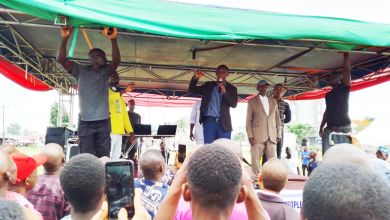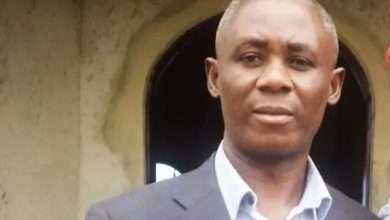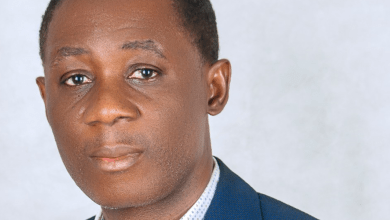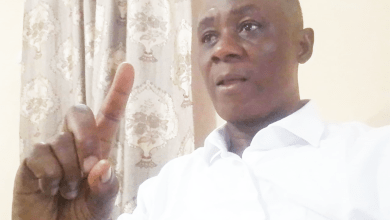Like Mandela, Like Saro-Wiwa – By Laburah Ganago
One, a lawyer, the other a writer; both had a common thread running through their veins. They saw themselves as having been called to a higher duty- to deliver their oppressed peoples from the shackles of internal colonization. And they had an utmost conviction for the justness of their cause, so much so that they were willing to lay down their lives for their beliefs.
But they were both up against very powerful and entrenched interests .One was apartheid ( the worst form of racial segregation and discrimination), the other, a dreaded combination of despotic military regime and a transnational oil corporation, Shell, which trades human blood for profit. In an interview conducted by Newsweek’s Joshua Hammer from his prison cell, Ken Saro Wiwa said this of his captors : “The men we are dealing with are mindless, Stone Age dictators, addicted to blood. They have been responsible for the African nightmare, afraid as they are of ideas and men of ideas. They are daylight robbers who kill for money ( Newsweek, May 29, 1995).
However, Ken Saro Wiwa was not just a writer. Newsweek magazine described him as an internationally renowned Nigerian journalist, poet and environmentalist. Of him, Tunji Olaopa wrote: “The year 1990 was a watershed for Saro-Wiwa, as it was the time he committed himself to ameliorating the problems of oil production and spillage in Nigeria’s Niger Delta regions. Focusing on his homeland, Ogoni, he launched a nonviolent movement for social and ecological justice: the Movement for the Survival of Ogoni People (MOSOP). In a role similar to Gandhi’s satyagraha, Ken Saro-Wiwa challenged the oil companies and the Nigerian government of that era, reproving them for waging an ecological war against Ogoniland and occasioning an alleged genocide of the Ogoni people. The principal goal of MOSOP was simple: a fair share of the proceeds of oil extraction, increased autonomy for the Ogoni people and remediation of environmental damage to Ogoni lands by foreign oil corporations. ( ThisDay, August25, 2013).
Tunji Olaopa continues: “As much as Saro-Wiwa believed that crude oil extraction with extreme environmental damage and decades of indiscriminate petroleum waste dumping needed to be significantly mitigated, so did he insist on a corruption-free society where everyone, irrespective of their ethnic affiliations, had equal chances to articulate a decent existence. So Ken Saro Wiwa was also an anticorruption campaigner and a social reformer. These are attributes that would put him at odds with the ever corrupt and criminal cabal that has perpetually ruined, sorry, ruled Nigeria, Africa’s giant headache. The defunct Newsweek magazine in its May 29, 1995 edition noted that :“ Saro Wiwa’s campaign against the despoliation of oil-rich Ogoniland by Shell Petroleum Development Co. and the Nigerian government has made him an enemy of the state”.
Yet, Ken Saro Wiwa had no patience for the cabal that would later conspire to murder him. He described the Nigerian government as “ organized banditry”. And he is absolutely right. Nigeria continues to be ruled by criminals and bandits. It does not matter if it is military juntas or bandits in civilian uniform, the central theme is” lootocracy”. Each successive Nigerian administration continues to expand the looting spree.
Although the system in Nigeria is not exactly as in apartheid South Africa it (was) is close to it. Ken Saro Wiwa actually compared the Nigerian system to that of then apartheid South Africa, when he noted:”The military government in Nigeria has sat on other Nigerians in a way that is just as evil and bad as it was in apartheid South Africa
“In what looks like a mission statement Nelson Mandela said: “ In my youth in the Transkei I listened to the elders of my tribe telling stories of the old days. Amongst the tales they related to me were those wars fought by our ancestors in defense of the fatherland. The names of Dingane and Bambata, Hintsa and Makana, Squnghti and Dalasile, Moshoeshoe and Sekhukhuni, were praised as the glory of the entire African nation. I hoped then that life might offer me the opportunity to serve my people and make my own humble contribution to their freedom struggle”. Then life offered Mandela to make a not so humble contribution to the freedom struggle big time!
Ken Saro Wiwa set out on his collision course with the slick allies-Shell and the Nigerian government with this statement: “As of this moment, I found that the Ogoni people are going extinct . No hospitals, no schools. There is nothing. And yet, this is a very rich area. I cannot accept that paradox … I have perceived a great injustice being done to this people and as a writer, I have decided that I am going to fight. I want justice for the Ogoni people, I want self determination for the Ogoni, I want autonomy for the Ogoni people “.I was unhappy about what was happening to the Ogoni people as an oil producing area, because from the beginning even though I was young, I could see that nothing was coming to the Ogoni people. Even though I was still a high school student, I started writing about it”.
Nelson Mandela was defiant when he appeared for his own defense, before the court that convicted him. He took advantage of his trial to indict his accusers and the system he spent the better part of his life fighting. He was unapologetic in affirming his determination to confront the evils of apartheid and their perpetrators. In his statement of defense he stated inter alia :” I admit immediately that I was one of the persons who helped to form Umkhonto we Sizwe.
I deny that Umkhonto was responsible for a number of acts which clearly fell outside the policy of the organization, and which have been charged in the indictment against us. I, and the others who started the organization, felt that without violence there would be no way open to the African people to succeed in their struggle against the principle of white supremacy. All lawful moles of expressing opposition to this principle had been closed by legislation, and we were placed in a position in which we had either to accept a permanent state of inferiority, or to defy the government. We chose to defy the law”.
Ken Saro Wiwa toed Mandela’s line in his own defense before a kangaroo court (Military tribunal). Having been sentenced to death by hanging, on a trumped-up charge of murder, Saro Wiwa in his statement of defense emphatically proclaimed his resolve to holdfast to the end in spite of his daunting fate as he declared: ” My lord, we all stand before history. I am a man of peace, of ideas.
Appalled by the denigrating poverty of my people who live on a richly-endowed land, distressed by their political marginalization and economic strangulation, angered by the devastation of their land, their ultimate heritage, anxious to preserve their right to life and to a decent living and determined to usher to this country as a whole, a fair and just democratic system which protects everyone and every ethnic group and gives us all a valid claim to human civilization. I have devoted all my intellectual and material resources, my very life, to a cause in which I have total belief and from which I cannot be blackmailed or intimidated. I have no doubt at all about the ultimate success of my cause, no matter the trials and tribulations which I and those who believe with me may encounter on our journey. Nor imprisonment nor death can stop our ultimate victory”.
Yet, Mandela’s most defiant declaration is found in these lines: “During my lifetime I have dedicated myself to this struggle of the African people. I have fought against white domination, and I have fought against black domination. I have cherished the ideal of a democratic and free society in which all persons live together in harmony and with equal opportunities. It is an ideal for which I hope to live for and to achieve . But if needs be, it is an ideal for which I am prepared to die”.
Nelson Mandela, the patriarch of African liberation movements was released from prison the same year that Ken Saro Wiwa and other Ogoni leaders launched the Ogoni struggle. The struggle was launched under the auspices of the Movement for the Survival of the Ogoni People, MOSOP in 1990. However, Mandela’s own story and that of Martin Luther King Jr. seemed to have inspired the Ogoni leader. In turn, Saro Wiwa’s story would have made Mandela proud. But one would argue that Mandela could not have come out of prison at a more opportune time for the Ogoni Struggle.
By the time Ken Saro Wiwa was sentenced to death by the military appointed kangaroo court on October 31, 1995, Nelson Mandela was already the President of South Africa and exerted enormous influence on the African continent. And he was expected to add his voice to others around the world, including those of then U.S President Bill Clinton, and then British Prime Minister John Major. But Nelson Mandela failed Ken Saro Wiwa and indeed the Nigerian people when his influence was needed most. Commenting on this sad and regretful episode of the Mandela legacy, The Wall Street Journal of Saturday/Sunday December7-8,2013 wrote: “
Nigerian activists spent much of 1995 asking Mr. Mandela to speak out against the pending execution of Ken Saro Wiwa, the environmental activist who protested frequent oil spills in the country. He had become a cause célèbre for the same Nigerian intellectuals who had helped imposed crippling oil sanctions on South Africa’s apartheid regime. Mr. Saro Wiwa had been convicted of inciting the murder of four pro-regime chiefs, but he and many allies in the human rights community insisted he had been framed. Mr. Mandela declined to intervene publicly and Mr. Saro Wiwa was hanged later that year”.
However, in acting belatedly Nelson Mandela may have underestimated the bestiality of General Abacha , as the late South African President reportedly pushed for the Commonwealth nations to suspend Nigeria from the organization, after the executions.
Thank goodness, unlike Ken Saro Wiwa Nelson Mandela did not die in the hands of his tormentors, but Mandela lost the opportunity to maybe, save the life of someone like him.
Leburah Ganago
Atlanta, Georgia,
United States.




